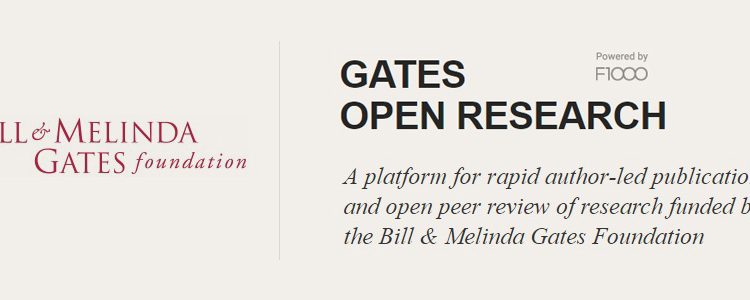Gates Open Research: Private Funding Platforms Take Control of Academic Publishing

The Bill and Melinda Gates Foundation has demonstrated its support for rapid dissemination of research data through the open access policy that they support. Self-described as impatient optimists, the Foundation’s open access policy is among the most far-reaching to date. The policy requires that the works supported by the Bill and Melinda Gates Foundation be published under fully open access terms and that the publication and associated datasets be governed by a Creative Commons CC-BY 4.0 license that allows the users of the publication to freely share and adapt the work including for commercial purposes also. Their policy also requires the research, and any associated underlying datasets become freely available immediately upon publication, thereby, eliminating the customary embargo period employed by some journals. The applicable open access publication charges are borne by the Gates Foundation.
Gates Open Research
The Bill and Melinda Gates Foundation has recently partnered with F1000 to create the Gates Open Research publication platform. This is the newest publication medium that researchers supported by the Gates Foundation can use in order to disseminate their data in a way which is fully compliant with their open access policy. F1000 is an abbreviation for the Faculty of 1000—a cadre of experts who provide peer review and recommendations as needed. The faculty presently has about 6,000 members. This is an online platform geared towards assisting life science and medical researchers via three specific products. F1000Prime that helps researchers discover the most relevant articles in their field. This is based in part on recommendations of the Faculty Members. F1000Workspace is a suite of tools to assist with writing and publication. Finally, F1000Research is an open science post-publication peer review platform. Gates Open Research is based on F1000Research’s format.
Gates Open Research, like F1000Research, will give authors significantly more control than normally given to them by a traditional publication model. Authors can decide what and when to publish, including replication studies and negative results. Authors will also be able to suggest reviewers for their paper or choose from a list of suggested reviewers. Once submitted, the article has to pass basic editorial checks by the F1000 faculty prior to publication. This initial process usually takes a week.
Peer Review
Once published, the article then undergoes open peer review. Reviewers will provide a detailed critique of the paper to which the author may respond. The author may choose to revise the paper, which will trigger a further round of peer review. This back and forth will continue until the author wishes to make no further changes. The entire discourse remains visible to all, including the version changes for the paper. The article clearly states the peer review status and version number of the article. Once it has passed peer review, it is listed in major publication databases, including PubMed. Like the published article, the detailed reviews are also available and citable.
Other Open Access Publishing Platforms
The Bill and Melinda Gates Foundation is the second funding body to partner with F1000 to generate an open-access academic publishing platform. The Wellcome Trust was the first. Their academic publishing platform, powered by F1000, is called Wellcome Open Research. This publication model enables rapid dissemination of data. It also invites quality peer review since the process is completely open and becomes part of the permanent record. This has the potential to make the process of publishing academic research more author-centered. It might also move the publication process away from a summary judgment on a researcher’s work and towards a collaborative effort to improve the quality of science that is published.









